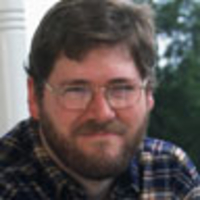
I Am a Buccaneer-Scholar
I am a thinker with the temperament of a buccaneer. A buccaneer-scholar is anyone whose love of learning is not muzzled, yoked, or shackled by any institution or authority; whose mind is driven to wander and find its own voice and place in the world. For two decades, this has been the way I understand myself. I use the metaphor of buccaneering not just for learning but also to deal with the emotional battles within myself and the intellectual battles I sometimes fight with other people. It helps me feel better about being an outsider. Whenever I meet people who think for themselves, I see them as fellow buccaneers.
The pattern I experienced at Apple would be confirmed almost everywhere I traveled in the computer industry: Most people have put themselves on intellectual autopilot.
Catching the College Kids
I was a nervous man on my first day at Apple. At 20, I was the youngest manager in the building. In all the gatherings and reorganizations we went through during the four years I worked there, I never met a younger manager. I was younger than many of the interns.
Also, I was a contractor. That meant Apple could fire me without notice or severance. I had little money and no credit.
The worst thing was that nearly everyone around me had a university degree. A good many had graduate degrees.

I had to catch up to the college kids. I brooded on it every day. I came to work with desperate fire in my soul to learn. Learn everything. Learn it now.
I began by scouting. The learning resources at Apple were overwhelming. I felt giddy. There were classes I could take. Visiting scholars gave seminars in the building. Our corporate fileservers were crammed with technical documentation.
The San Jose area (also known as the South Bay, Silicon Valley, or simply The Valley) is home to fabulous bookstores. And in those days Apple Computer had one of the best corporate libraries in the industry, fully staffed with reference librarians who—just like me—wanted to justify themselves through service.
As a manager, I supervised five testers, but no one closely supervised me. My boss, Chris, was in meetings most of the time. He needed me to get on with the work as best I could. This meant I could sneak away and read. I spent part of each afternoon in a donut shop across the street from my building, studying without interruption.
Chris was supportive. “You should not just read about software,” he suggested. “Try to find solutions to our problems in other disciplines.” Maybe Chris was more supportive than he ever knew. I treated that one casual suggestion as permission to spend work time to learn anything. I browsed many of the two hundred or so academic journals that came through the library. Even crazy stuff. I read Anthropometry of Algerian Women and Optimum Handle Height for a Push-Pull Type Manually Operated Dryland Weeder.
Of course I read every testing book I could find. I discovered software testing standards and studied those, too. I studied most evenings and weekends.
At first I thought I would learn a lot from the other testers. There were more than 400 of them in my building. But talking to them revealed a startling truth: Nobody cared.
Almost nobody. In the first six months I worked at Apple, out of all the testers in the software testing division, I met maybe 10 who were also reading testing books. The rest muddled through without much ambition to master their craft. It was clear that catching the college kids would not be difficult, after all.
The pattern I experienced at Apple would be confirmed almost everywhere I traveled in the computer industry: Most people have put themselves on intellectual autopilot. Most don’t study on their own initiative, but only when they are forced to do so. Even when they study, they choose to study the obvious and conventional subjects. This has the effect of making them more alike instead of more unique. It’s an educational herd mentality.
I talked to coworkers who wanted to further their education, but they typically spoke in terms of getting a new piece of paper, such as a bachelor’s degree, a master’s, or a Ph.D. For them, education was about the doors they believed would open because of how they were labeled by institutions, not about making themselves truly better as thinkers. Buccaneers, on the other hand, don’t take labels too seriously. A buccaneer studies in the hope of unlocking Great Secrets! Wonder! Mastery! A buccaneer lives for the excitement of deciphering the mysteries of human experience. A buccaneer wants status, too, but only if that status is justly earned and sustained through the quality of his work.
I wanted to do good work at Apple. I burned with desire to feel useful. I resolved to become expert at my craft. I believed if I achieved that, wealth and status would follow. Labels like “master’s degree in computer science” held no appeal for me. It dawned on me that success is not about what you know, it’s about what you can discover and create. It’s not about what you are, but about what you are becoming and what you can cause to happen. It’s about learning, what I call intellectual buccaneering. I would create my own success by creating my own education. I would win reputation on the basis of merit rather than ceremony. That’s the buccaneer way.
Not only could I compete in the software testing industry with-out the labels of formal schooling, I could rise to the top of the field.
My competitive advantages were:
- A habit of self-education (due to the need to survive)
- Eagerness to question traditional ideas (due to my distrust of authority, lack of discipline, and desire to live authentically)
- The diversity of my studies (due to my restless attention span)
- Ambition (flaring up, now, because I felt needed)
This is a truth I couldn’t have known in elementary school, nor in high school, back in Vermont. I wouldn’t have seen it working at the office-supply store in Iowa, nor in Dale Disharoon’s garage in the little town of Chico. But here the truth was undeniable. Here I was surrounded by hundreds of engineers doing knowledge work in the heart of Silicon Valley, the cream of the industry, and I was doing fine! That’s when I understood: What I thought were my weaknesses were actually my strengths! I could not succeed within the structure of formal schooling, but that very independence would lead me to excel in the “real world.”
Plus: Check out Book Beast for more news on hot titles and authors and excerpts from the latest books.
James Bach is a computer software expert, who has taught critical thinking and software testing to rocket and nuclear scientists at the Los Alamos and Lawrence Livermore National Laboratories, and the Jet Propulsion Laboratory. He lives in Eastsound, Washington.






